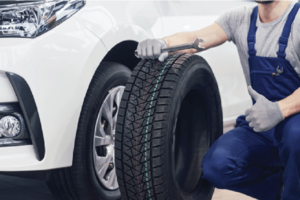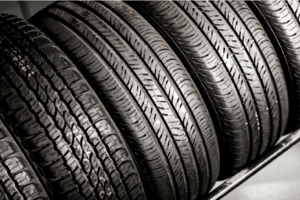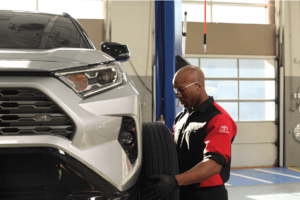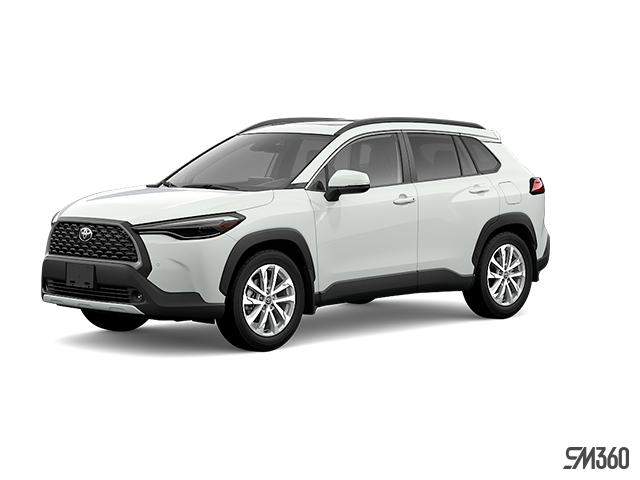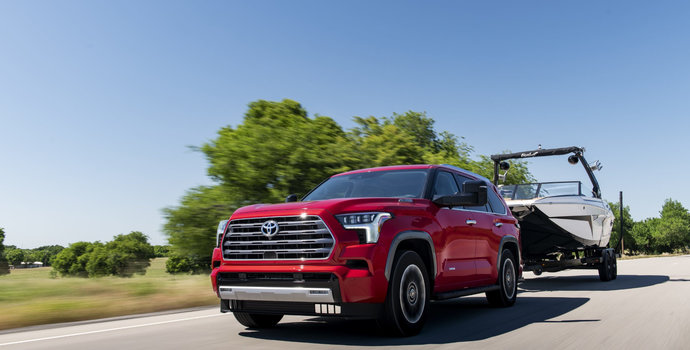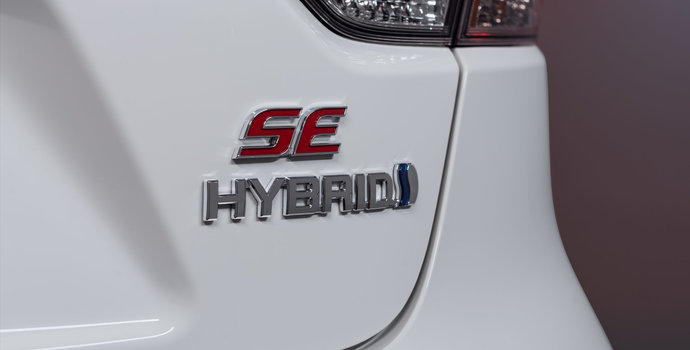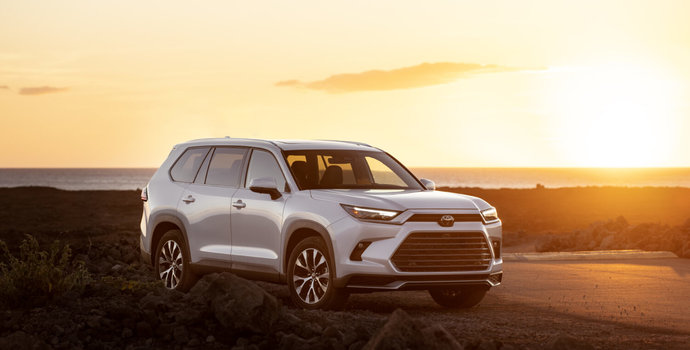Your Toyota vehicle is made for dependability and reliability, but there are four parts that it needs to work properly-its tires. Tires can make or break the driving experience. Here are some facts to help you get a better handle on everything related to your Toyota tires.
Tire Sizes
The original equipment manufacturer (OEM) tires that come standard on your Toyota vehicle are in the size that was deemed most appropriate for the vehicle. You might find all the letters and numbers confusing in your tire's size. Here's what it means for a vehicle with a tire size P235/40R19 99 V:
- P - Indicates that it is a Passenger car tire
- 235 - Indicates the width of the tire in millimetres
- 40 - Indicates the aspect ratio--this is the height of the sidewall as a percentage of the width
- R - Indicates that it is a Radial tire, which is built for fuel efficiency and strength
- 19 - Indicates tire diameter
- 99 - Indicates the load index, which is how much weight the tire can support when at maximum air pressure
- V - Indicates maximum speed rating. S=180 km/h, T=190 km/h, V=240 km/h
Can I Change the Size of the Tires on My Toyota Vehicle?
- Toyota takes performance, safety, and fuel efficiency into consideration when selecting tire size, so it is recommended that you stick with the same size when purchasing and installing replacement tires or winter tires. Changing the tire size can affect the ride comfort, handling performance, and operation of the speedometer or odometer on your Toyota vehicle.
Tire Pressure
- Where do I find the recommended tire pressure for my Toyota?
a. Recommended tire pressure is listed in the Owner's Manual for your vehicle, as well as on your vehicle either on a label inside the glove compartment door or the driver's door pillar.
- How does the Tire Pressure Monitor System work on a Toyota?
a. There is a small sensor on each of your vehicle's tires that detects the air pressure inside of them and relays that information to your vehicle's computer.
- How do I check the tire pressure, and how often should it be done?
a. You should monitor your system daily for alerts about tire pressure being too low or too high. If your Toyota vehicle does not have a tire pressure monitor system, you should manually check it with a tire gauge once a month or when the temperature changes drastically.
- How can I tell if the tire pressure is too high or low?
a. You should refer to the recommended tire pressure for your vehicle. Pressure within one or two PSI is normal, but you should adjust the tire pressure by putting more air in or letting some out if it is outside that range.
- Why does tire pressure change with temperature?
a. When it is cold, the air inside your tires condenses, taking up less space. When it is hot, the air expands and takes up more volume. As a result, tire pressure generally moves by one PSI for every 10 degrees in temperature change.
- Do light truck tires need higher pressure than that of a car?
a. It depends on the vehicle and its weight. You should always follow the recommended tire pressure stated in your Owner's Manual.
Tire Tread
Tire treads are the grooves and lines on the outside of your tires. Over thousands of kilometres, the tread begins to wear away. After a while, it will begin to affect traction and braking time.
- How do I assess tread wear?
a. Take a quarter and insert it into one of the tire's grooves. New tires are in order if you can see the tip of the caribou's nose. You can also visit the Service Centre, and your Toyota Technician can check and record tire tread depth, assess for damage, and determine if new tires are needed.
Tire Rotation
Tire rotation means taking all four tires off your vehicle and switching their locations (front left tire to back right tire, and right-front tire to back left tire). Tire rotation should be completed as outlined in your vehicle's maintenance schedule. Tire rotation ensures more even wear and better performance, as well as extending the life of your tires.
Tire Storage
Tires should be stored inside and out of the elements, but many drivers do not have the space to accommodate a set of four tires. For that reason, Goderich Toyota offers convenient storage of winter and summer tires.
Wheel Alignment
A wheel alignment is an adjustment of your Toyota vehicle's suspension system. This allows your tires to meet the road at the proper angle. You should have your wheel alignment checked once a year, but if you notice your steering wheel is not sitting right, your tires are wearing unevenly, or your vehicle is shaking or vibrating, you need to have your alignment checked right away.
Driving in the Snow
The best tires for snow are winter tires. They are designed specifically to perform well in both snowy and icy conditions and cold temperatures.
- Can I use all-season tires in the snow?
a. While all-season tires provide good performance in a wide variety of conditions, they will not offer the traction that winter tires will.
- Are snow tires an adequate substitute for a four-wheel drive?
a. A front-wheel-drive vehicle will perform very well in the snow with a set of good winter tires.
Toyota Tires
- What is Toyota's Price Match Promise?
a. If you find a better price on the same tire that Toyota offers, Toyota will match it. If you already purchased tires from Toyota and find a lower price, you can receive a refund on the difference if the purchase was within 30 days. Conditions may apply.
- Are the tires on my Toyota vehicle warranted by Toyota Canada?
a. No, they are warranted by the tire manufacturer, not Toyota Canada.



